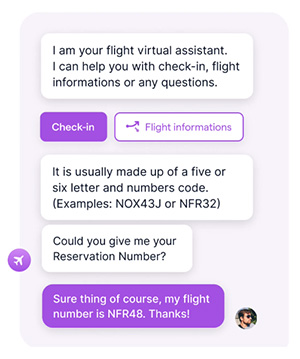Meet your new customer advisor: a chatbot!
The chatbot, or conversational agent, is a piece of software that is programmed to talk to you. You often find them on online stores: they are notably there to answer your questions about a product or order. And they are not going away anytime soon: the chatbot market is expected to reach an estimated value of $990 million by 2024! Within this effervescent climate, the startup Mindsay was created and positioned with a focus on customer service in tourism and mobility. Co-founder and CEO Guillaume Laporte tells us about this adventure in a 100% chatbot-free interview.
What is Mindsay’s story?
Guillaume Laporte: Our startup was born in September 2016. We are three partners with complementary experiences in the fields of travel and transport. That’s what gave us the idea for Mindsay. Why Mindsay? Because these sectors have a significant time constraint: an airplane cannot wait, while travelers need efficient and fast answers. Second, because we have found that users tend to behave in the same way in their interactions with travel agencies, airport representatives and airlines. That makes it possible to aggregate knowledge and data between the various stakeholders in the process.
Mindsay offers a conversational artificial intelligence solution - a chatbot or virtual assistant - that uses algorithms to answer a user’s questions, either by chat or by voice.

How do chatbots work?
It’s a suite of algorithms that simulate human behavior within a chat interface.
When a user sends a text or voice message, for instance to get flight information, the algorithm performs the following steps:
• It identifies the sentence (in the case of voice, there is an additional step of “translating” voice into text), reads the string and draws an analogy with already known sentences.
• It detects what we call “regular expressions”, such as, in our case, a departure or arrival city.
• It chooses the best response scenario for its analysis of the sentence.
• It will then search for the answer in an information system (belonging to the airport or airline).
• Finally, it composes an answer based on these constituent elements: departure city, arrival city, travel schedules, etc.

As the conversations proceed, the algorithm reinforces its confidence that, for a certain type of request, it has the right answer. It becomes more pertinent and accurate over time. That is why this type of tool is referred to as “self-learning”. ”. And, since this type of learning is pooled between different types of companies in the same field, it creates a virtuous circle.
million hours saved for customer services using chatbots in 2022
How did you start working with the ADP Group?
We met with the ADP Group in February 2017, shortly after launching Mindsay. We developed an initial prototype for the Innovation teams, then a second prototype in 2018, with a test phase among a user group at Paris-Orly. These two successful projects led the group to invest in our fundraising campaign in 2019 and to integrate a chatbot into their application.
That’s how long it takes the Mindsay chatbot to come up with a satisfactory answer.
The chatbot is able to answer Level 1 use cases: booking, service disruption or airport questions. For more complex questions, which are unique use cases, including exceptions that require empathy, consideration of the context or decision-making, the chatbot directs the user to customer service, since it cannot reinforce its competence without recurring use cases. This allows customer service teams to focus on higher value-added requests, thus making their job more meaningful.
We plan to deploy the chatbot in 2020 on the website, WIFI portal and at the various points throughout traveler journeys.
of customers prefer smart chatbots to human interaction due to their fast responses
What does the future hold for Mindsay?
Our R&D team is continuing to invest in the reinforcement learning model in order to boost our chatbot performance. We have already signed more than 20 large accounts in France. We are also expanding abroad: we are already present in Spain, Switzerland, Belgium, the United States and the United Kingdom.